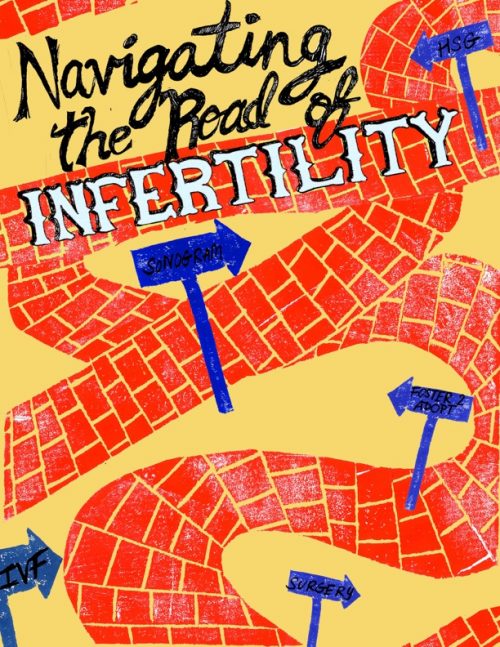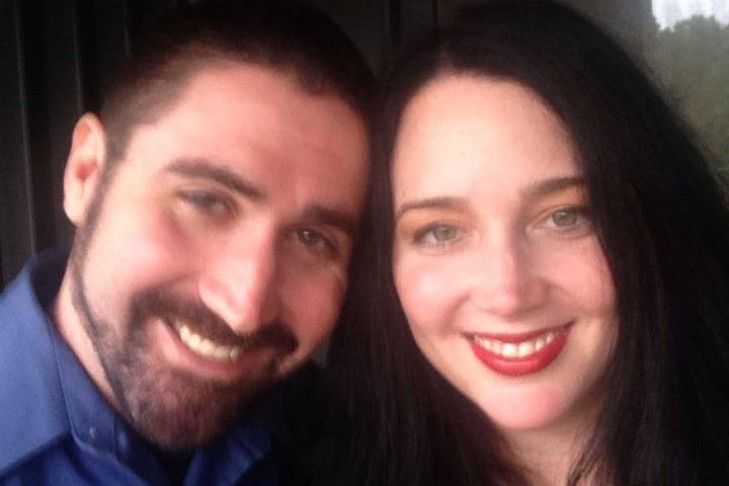Aaron and Chrissie Kahan’s love story began like any other: They met at a bar. The two Maryland educators (she’s an assistant principal, he works in special education) got married and decided they wanted to start a family. How hard could it be? She was 31, he was 26, and they were seemingly healthy.
That was five years ago. It wasn’t that simple.
After a few months of trying, Chrissie suspected that something might be amiss.
“I’m a triple ‘Type A’ person,” she says with a laugh. “I was asking my doctor what was wrong and was told, ‘Oh, it just takes time.’”
Six months later, she says, she had to “beg for a sonogram.”
It turned out that Chrissie had a fibroid tumor. Aaron was examined, too, and was found to have a varicocele, an enlarged vein that can affect fertility.
The couple was sent to a specialist who urged in-vitro fertilization, telling them it was highly unlikely that they’d ever conceive naturally.
“We hadn’t considered this. Aaron is Jewish. I’m Christian. I’m very strong in my faith. My thinking is, if I’m not meant to carry a baby, if God knows something is wrong in my body, I don’t want to explore it. Maybe I’m supposed to adopt,” Chrissie says.
Traditional adoption is expensive—$30,000 and up. The couple decided to explore a “foster to adopt” program instead, wherein they could foster a child and ultimately adopt him or her.
A few months later, two little girls, 5 and 7, were placed in their home in an emergency after their grandparents had custodial rights taken away.
“Within the first week, they called us ‘Mommy’ and ‘Daddy,’” says Chrissie.
But it wasn’t to be. Several months later, the little girls were reunited with their mother, who had drug problems.
The couple was devastated. They couldn’t bear to spend the night at home, still full of toys and clothes. So they drove to Ocean City, Md., found a hotel room, and started writing their book. The result? “Navigating the Road of Infertility,” which came out in October 2016. In it, the couple explores the raw emotion, grief and resilience that childlessness can bring.

Even after returning to their everyday lives, writing became a catharsis.
“Once you’re a parent, your whole world exists for that child. We had free time without the girls, so we had date nights writing. Aaron would do his part and I would do mine, and we’d review each other’s work and give notes. It became a good outlet for us,” Chrissie says.
They also decided to explore in-vitro fertilization in earnest. It was brutal. Aaron injected her with needles, causing bruising and scars. Then, during the traditional egg-retrieval process, Chrissie began to turn blue. Her heart rate dropped.
“I almost died,” she says.
Her doctors thought she had sleep apnea. The cycle didn’t take. She tried again the following month. The same thing happened. But she got pregnant—for a bit. After six weeks, it was discovered that she had a blighted ovum, wherein a fertilized egg attaches to the uterine wall but an embryo fails to develop. She miscarried. And during the next retrieval cycle, she turned blue again.
This time, her doctors were more concerned. In late 2016, she was told that she might have a blood-clotting disorder, thrombophilia. Getting pregnant seems more dangerous than ever. Not to mention expensive: While the couple’s insurance has covered about $70,000, they say, they still pay thousands of dollars each month out of pocket for specialists’ fees.
“You try to keep going to the next step, but there isn’t really a next step right now. That’s hard,” Chrissie says. “This clotting disorder could potentially kill me. It could affect other areas. So the next step is to see a blood specialist, and my fertility center won’t talk to me about it until I see them.”
But the book has provided a focus despite the frustration. Aaron, who attended Jewish day school as a child, says his faith has helped, too.
“My spirituality has kept me calm in some of the more tumultuous spots during this whole situation. Judaism helped me get there. I wouldn’t consider myself religiously Jewish, but definitely having that religion in my life so early on helped me to not freak out so much, like during the miscarriage,” he says.
It’s been difficult to talk about his fertility struggles, he says, because so often it’s seen as a woman’s problem.
“People are a bit less careful with the words they choose with me. It’s more dismissive toward a guy, because the guy isn’t affected that much. The guy’s part is very small. But I did all the injections. I was the one who caused the bruises on her stomach,” he says.
Often, well-meaning people try to tell him that he and Chrissie will get pregnant eventually. Now, he has a response.
“I’ll be honest and say we can’t conceive—let’s cut this off right here. People tell me it’ll happen when it’s supposed to. And it’s like, oh, no, you don’t get it. Seriously. It won’t happen,” he says.
Chrissie has tips for friends and family, too.
“Don’t give advice unless it’s asked for. Don’t share your perfect story of a friend you know who had a baby somehow. Don’t ask someone when they plan to have kids. Just be there,” she says.
The couple realizes that most people just want to help. It’s natural, says Chrissie, a reflexive way to reach out.
“My single girlfriends and I used to joke about it,” she says. “When you’re single, you wonder when you’ll get a boyfriend. When you’re dating, people ask when you’ll get engaged. Then people ask when you’ll have kids. Really, people are just trying to connect with you. They don’t mean to be intrusive. It just really hurts.”
It can hurt a relationship, too. Chrissie and Aaron fight sometimes.
“But that’s healthier than holding it all in,” Aaron says. Non-verbal communication helps—loading the dishwasher, sending a text.
“We just try to let each other know that we’re thinking of the other person,” Chrissie says.
And now, they wait. Chrissie is working on a children’s book about anxiety. Both keep busy at work. And although they both work with children, they say it helps, not hurts.
“People have said to me, ‘I can’t believe you’re coming into school!’ But I don’t find it difficult at all,” Chrissie says.
Harder are the family events that she used to attend with her foster daughters. “I can still picture them running around,” she says.
They’re still hopeful that someday, they will have a family. And in the meantime, they hope their book will help other hopeful parents dealing with the same battle.
They dedicated their book to other families sharing their silent struggle.
“To those of you who have been forced to travel down this road: Your strength, courage and hope are more inspiring than you may realize. We dedicate this book to you,” they write.
This post has been contributed by a third party. The opinions, facts and any media content are presented solely by the author, and JewishBoston assumes no responsibility for them. Want to add your voice to the conversation? Publish your own post here. MORE



